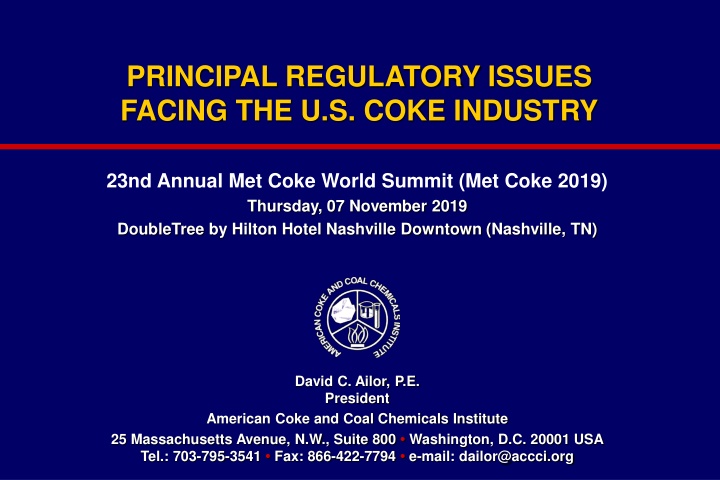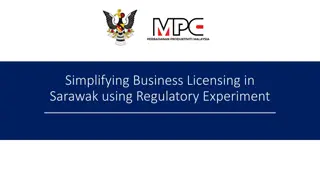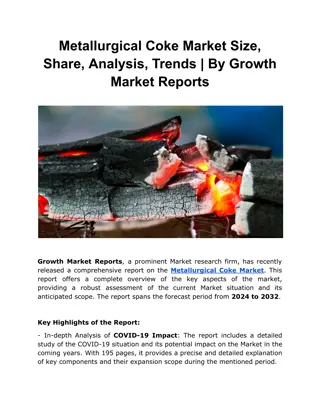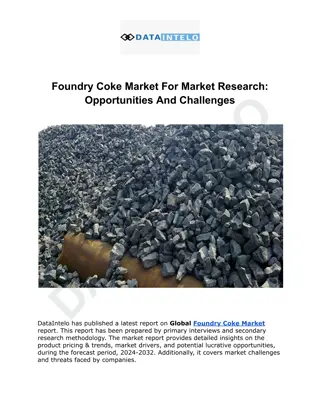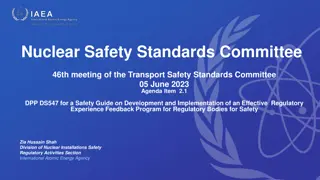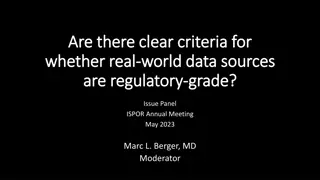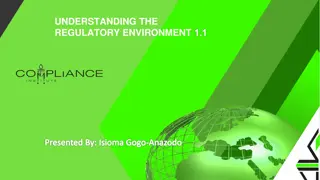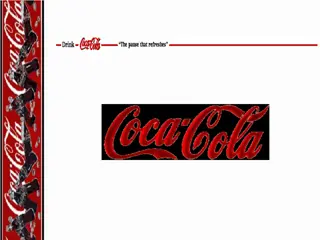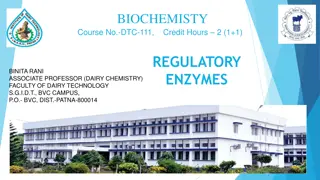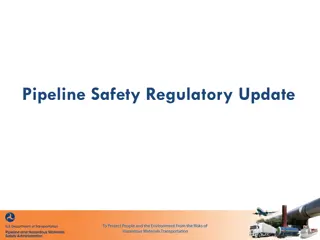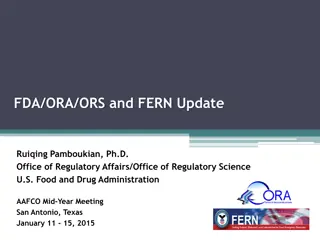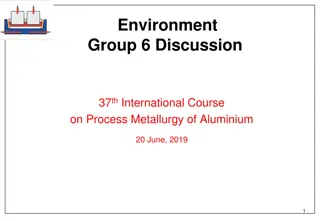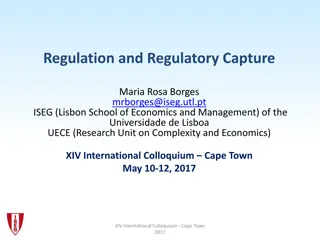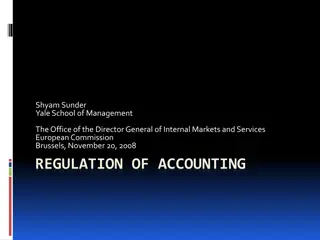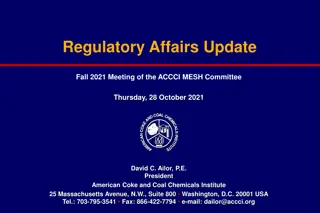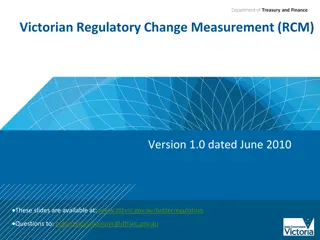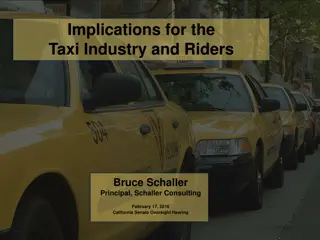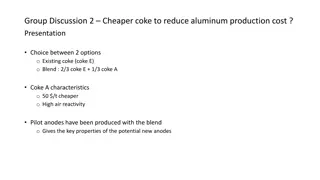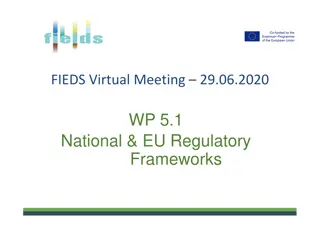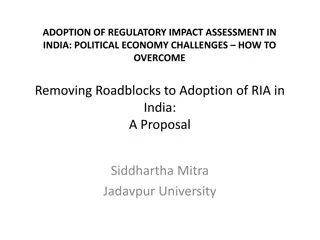Regulatory Challenges in the U.S. Coke Industry: Insights from the ACCCI
The American Coke and Coal Chemicals Institute (ACCCI) addresses regulatory issues concerning the U.S. coke industry, representing major players in coke and coal chemicals production. The institute focuses on sector-specific concerns, industry regulations, and advocating industry interests to governmental bodies. With membership from key industry stakeholders, ACCCI plays a vital role in promoting responsible practices and navigating the regulatory landscape to ensure the sustainability of the coke industry.
Download Presentation

Please find below an Image/Link to download the presentation.
The content on the website is provided AS IS for your information and personal use only. It may not be sold, licensed, or shared on other websites without obtaining consent from the author.If you encounter any issues during the download, it is possible that the publisher has removed the file from their server.
You are allowed to download the files provided on this website for personal or commercial use, subject to the condition that they are used lawfully. All files are the property of their respective owners.
The content on the website is provided AS IS for your information and personal use only. It may not be sold, licensed, or shared on other websites without obtaining consent from the author.
E N D
Presentation Transcript
PRINCIPAL REGULATORY ISSUES FACING THE U.S. COKE INDUSTRY 23nd Annual Met Coke World Summit (Met Coke 2019) Thursday, 07 November 2019 DoubleTree by Hilton Hotel Nashville Downtown (Nashville, TN) David C. Ailor, P.E. President American Coke and Coal Chemicals Institute 25 Massachusetts Avenue, N.W., Suite 800 Washington, D.C. 20001 USA Tel.: 703-795-3541 Fax: 866-422-7794 e-mail: dailor@accci.org
PRESENTATION OVERVIEW Overview of ACCCI/ACCCI Membership Current Status of the U.S. Coke Industry Background on the ACCCI-Managed Coke Oven Environmental Task Force (COETF) Principal Sector-Specific Regulatory Issues of Concern to the U.S. Coke Industry Principal Regulatory Issues of Concern to One of the Coke Industry s Important Customers, the Coal Chemicals Industry Principal General Industry Regulatory Issues of Concern to the Coke Industry 2 Other Important Regulatory Affairs Issues
AMERICAN COKE AND COAL CHEMICALS INSTITUTE (ACCCI) ACCCI was formed in 1944 by companies interested in establishing a forum to discuss and act upon issues of common concern to the metallurgical coke and coal chemicals industry. Today, ACCCI members represent over 95% of the metallurgical coke produced in the U.S. and Canada, including both merchant coke producers and integrated steel companies with coke production capacity, and 100% of companies producing coal chemicals in the U.S. and Canada. ACCCI s function is to advance the interests of the metallurgical coke and coal chemicals industry by communicating industry positions to members of Congress and Federal regulatory officials; cooperating with governmental agencies having jurisdiction over the industry; providing a forum for the exchange of information and discussion of issues; collecting statistics related to the industry; and, promoting the use of coke and its byproducts in the marketplace. 3
ACCCI MEMBERSHIP Merchant companies that produce furnace/foundry coke for sale on the open market Steel companies that produce coke for use internally in their production of steel Coke sales agents Producers/processors of chemicals derived from distillation of coal and coal tar ( tar refiners ) Industry suppliers 4
OVERVIEW OF THE U.S. COKE INDUSTRY 15 operating coke plants (49 batteries), one of which (2 batteries) is not a member of ACCCI 6 integrated steel by-product recovery plants (20 batteries) 4 merchant by-product recovery plants (9 batteries) 5 merchant heat-recovery plants (20 batteries) 5
THE INDUSTRY IS ORGANIZED TO ENGAGE REGULATORY AGENCIES AS THE NEED ARISES General Industry agency actions are typically handled by ACCCI, which focuses primarily on EPA general industry rulemakings/issues. Coke Industry-specific agency actions are typically handled by the Coke Oven Environmental Task Force (COETF), which focuses primarily on EPA rulemakings/issues specific to the coke industry (i.e., sector- specific rulemakings). 6
BACKGROUND ON THE COETF The COETF was formed by the American Iron and Steel Institute (AISI) and ACCCI in 1996 to address major environmental issues collaboratively. The COETF operates as a semiautonomous, self-funded entity. The COETF represents 8 of the 9 U.S. by-product recovery plants (27 by-product recovery batteries). 6 integrated steel by-product recovery plants (20 batteries) 3 merchant by-product recovery plants (7 batteries) Five heat recovery coke plants (20 batteries) are not represented by/participating in the COETF. Katie Kistler (AK Steel) is the chair of the COETF. 7
PRINCIPAL SECTOR-SPECIFIC REGULATORY ISSUES OF CONCERN TO THE U.S. COKE INDUSTRY EPA s Risk and Technology Review (RTR) of 2003 MACT Standards for Coke PQBS CAA 112(c)(6) Litigation 112(d)(6) RTR Deadline Litigation EPA s CERCLA Financial Assurance Rulemaking for the Coal Products Manufacturing Industry 8
EPAS RISK AND TECHNOLOGY REVIEW (RTR) OF 2003 MACT STANDARDS FOR COKE PQBS On April 14, 2003, EPA promulgated maximum achievable control technology (MACT) standards for coke pushing, quenching and battery stacks (PQBS). Standards are to limit hazardous air pollutants (HAPs) from PQBS (e.g., benzene, toluene, coke oven emissions ). Clean Air Act (CAA) requires EPA to determine within eight years of promulgation (i.e., by 2011 for PQBS) whether tighter standards should be issued, based on: risks to public health associated with MACT-level emissions (risk review); and, whether any improvements in control technology have occurred since the MACT standards were issued (technology review). (continued) 9
EPAS RISK AND TECHNOLOGY REVIEW (RTR) OF 2003 MACT STANDARDS FOR COKE PQBS (Concluded) EPA is behind schedule on the RTR for coke PQBS, having just kicked off the multi- year (three-to-four year) RTR in early 2015. The rulemaking is not yet subject to a court-ordered deadline, but a deadline will soon be established. RTR was a high priority of the Obama EPA s Acting Assistant Administrator for Air and Radiation, Janet McCabe. The EPA-OAQPS Project Officer, Dr. Donna Lee Jones, worked with the COETF to adjust the testing requirements, on the basis of justified safety, timing and expense issues. 10
COETF ISSUES OF CONCERN ON THE PQBS RTR Scope of EPA s Information Collection Request (ICR) Unit risk estimate for Coke Oven Emissions Underlying exposure assumptions for EPA s risk estimates Dispersion modeling Emission factors Cost to comply 11
LATEST DEVELOPMENTS ON THE PQBS RTR Individual company efforts on an April 2016 Information Collection Request (ICR) from EPA regarding coke pushing, quenching and battery stacks (PQBS) are at or near an end. EPA has received all of the Enclosure 1 submittals on the ICR (i.e., Questionnaire, which asked questions about the company and all of the operations at its coke plant(s)) EPA has received all of the company Enclosure 2 test reports on the ICR (i.e., Testing request, which included all of the details of where and how to test). EPA is ramping up its efforts on the PQBS RTR. EPA has compiled the Enclosure 1 responses and Enclosure 2 test results and, in August 2019, provided the Agency s Enclosure 2 spreadsheets to the respective companies for QA/QC. EPA s goal is to have the data totally ready by the end of 2019 and to start loading data into [a] modelling file in January 2020. The COETF is conducting strategic planning on the RTR. ACCCI is a member of the Residual Risk Coalition (R2C) of which it used to be a member. The COETF is working with counsel/technical consultants in strategic planning for the rulemaking. 12
CAA 112(C)(6) LITIGATION CAA 112(c)(6) requires source categories responsible for at least 90% of the aggregate emissions of seven Persistent Bioaccumulative (PBA) Hazardous Air Pollutants (HAPs) to be subject to standards under CAA 112(d)(2) [MACT] or 112(d)(4) [risk-based for specified HAP]. One of the seven HAPs is associated with coke oven emissions (COE) - polycyclic organic matter (POM). 13 (continued)
CAA 112(C)(6) LITIGATION (continued) In June 2015, EPA issued a rule stating that it had satisfied 112(c)(6) by promulgating standards for numerous specified source categories, including the NESHAPs for coke oven charging/topside/doors, by-product recovery plants, and PQBS ENGOs filed comments on the proposed rule that EPA had not satisfied its 112(c)(6) obligations with respect to POM from coke ovens because COE is not an appropriate surrogate for POM. ENGOs argue that EPA must promulgate new MACT standards for coke ovens specifically regulating POM. 14 (continued)
CAA 112(C)(6) LITIGATION (continued) In July 2015, ENGOs challenged the 112(c)(6) determination (Sierra Club v. EPA). Sierra Club challenged EPA s June 2015 determination that it had met all 112(c)(6) requirements arguing, among other things, that COE is not an appropriate surrogate for POM. Sierra Club wants EPA to promulgate new MACT standards regulating POM for coke oven charging/topside/doors, by-product recovery plants, and PQBS. In June 2016, an industry coalition comprised of seven associations (ACCCI, ACA, ACC, AF&PA, AFPM, AISI and NACWA) filed an amicus brief in support of EPA, arguing: ENGO claims are time barred; ENGO claims were raised previously and not pursued; and, EPA developed an adequate factual basis for use of surrogates. 15 (continued)
CAA 112(C)(6) LITIGATION (Concluded) On July 18, 2017, the U.S. Court of Appeals for the D.C. Circuit remanded but did not vacate the completeness determination on procedural grounds, holding that EPA failed to respond to Sierra Club s rulemaking comments regarding the reasonableness of EPA s pollutant surrogacy claims. As a result of the court s decision, EPA must respond to the comments on the pollutant surrogate issue for each of the 17 source categories challenged in the case, including subparts L and CCCCC. Implications: It is unlikely that EPA will set new MACT standards for POM. EPA has flexibility to address the surrogate issue comments in upcoming RTR rulemakings (for PQBS and several of the other source categories) or in a consolidated response to comments for all 17 source categories. POM-COE surrogacy issue may come up in the PQBS RTR rulemaking. 16
CAA 112(D)(6) RTR DEADLINE LITIGATION CAA 112(d)(6) EPA must review and revise existing NESHAPs as necessary (taking into account developments in practices, processes, and control technologies) no less often than every 8 years. April 3, 2015 ENGOs filed lawsuit in D.D.C. (CCAT v. EPA) to set court-ordered deadlines to complete RTRs for 20 source categories PQBS not included February 24, 2016 ENGOs filed a second lawsuit in D.D.C. (Blue Ridge Env. Def. Fund v. McCarthy) for 13 more source categories PQBS RTR not included February 13, 2019 ENGOs submitted to EPA a Notice of Intent (NOI) to file a deadline suit for the PQBS RTR and that for coke oven doors, lids, offtakes and charging (Subpart L). April 15, 2019 - ENGOs filed a Clean Air Act citizen suit seeking to require EPA to revise emission standards, or determine they are not required, for the PQBS RTR and that for coke oven doors, lids, offtakes and charging (Subpart L). 17 (continued)
CAA 112(D)(6) RTR DEADLINE LITIGATION (Concluded) On March 13 and 22, 2017, the District Court set the following schedules: December 31, 2018 Deadline to promulgate RTR for 7 source categories March 13, 2020 Deadline to promulgate RTR for 20 source categories June 30, 2020 Deadline to promulgate RTR for 6 source categories EPA will likely focus resources on these 33 RTRs, which may delay those not subject to court-ordered deadlines. Because PQBS RTR was not included in any of the two original deadline suits, the June 30, 2020, court-ordered deadline does not apply to the PQBS RTR. Coke industry is now awaiting the results of the settlement discussions between ENGOs and EPA on the ENGOs April 15, 2019, suit. COETF has engaged counsel and technical consultants and is planning for the upcoming PQBS and Subpart L RTRs. 18
EPAS CERCLA FINANCIAL ASSURANCE RULEMAKING FOR THE COAL PRODUCTS MANUFACTURING INDUSTRY On January 6, 2010, the Obama EPA published an Advance Notice of Proposed Rulemaking (ANPRM) identifying several classes of facilities, including coal products manufacturing (NAICS Code 324 (http://www.census.gov)) , for development of financial responsibility requirements under Section 108(b) of the Comprehensive Environmental Response, Compensation, and Liability Act (CERCLA). EPA s decision on the classes of facilities for development of financial responsibility requirements was based on an analysis of Toxic Release Inventory data and knowledge of chemicals found at Superfund sites. On April 5, 2010, ACCCI was a party to a multi-association comment letter to EPA on the ANPRM. On January 11, 2017, the Obama EPA proposed requirements for demonstrating financial responsibility within the hardrock mining industry in its CERCLA Financial Assurance Rule for the Hard Rock Mining Sector. EPA estimated the costs imposed by the rule would exceed $7 billion. EPA announced that it had decided to propose similar rules for the chemical manufacturing, petroleum manufacturing, and electric power generation, transmission and distribution industries. 19 (continued)
EPAS CERCLA FINANCIAL ASSURANCE RULEMAKING FOR THE COAL PRODUCTS MANUFACTURING INDUSTRY (continued) On December 1, 2017, the Trump EPA announced that the Agency would not issue final regulations for financial responsibility requirements for hardrock mining facilities, deeming that Additional financial assurance requirements are unnecessary and would impose an undue burden on this important sector of the American economy and rural America, where most of these mining jobs are based. On February 21, 2018, the Trump EPA published its final decision. 83 Fed. Reg. 7556. On June 19, 2019, the U.S. Court of Appeals for the DC Circuit ruled against ENGO s challenge of the final decision, upholding EPA s decision to forego promulgating financial responsibility requirements for the industry. Idaho Conservation League, et al., v. EPA, Case No. 18-1141. OMB-OIRA s Spring 2019 Regulatory Agenda (see https://www.reginfo.gov/public/do/eAgendaViewRule?pubId=201904&RIN=2050-AH06) indicated the petroleum and coal products manufacturing industry as the anticipated second of the three industries for which the Agency will make such determinations, with a proposed rule by December 2019 and a final rule by December 2020. (continued) 20
EPAS CERCLA FINANCIAL ASSURANCE RULEMAKING FOR THE COAL PRODUCTS MANUFACTURING INDUSTRY (Concluded) On July 29, 2019, the Trump EPA published in the Federal Register a proposal not to issue financial assurance requirements for the electric power sector. EPA s evaluation determined that the degree and duration of risk associated with the production, transportation, treatment, storage, or disposal of hazardous substances in the industry do not require financial assurance regulations. EPA is under a judicial deadline to issue a final determination for this sector by December 2020. In the July 29, 2019, Federal Register notice (see https://www.govinfo.gov/content/pkg/FR- 2019-07-29/pdf/2019-15094.pdf), EPA indicated that, under court order, the Agency will issue a proposal by December 4, 2019, for either the chemical manufacturing sector or the petroleum and coal products manufacturing sector. By December 1, 2022, it will proposed a rule for the third and last remaining sector. EPA seems to be keeping with the schedule for a December 2019 issuance of a proposal for the petroleum and coal products manufacturing sector - on November 4, 2019, EPA sent a draft proposed CERCLA 108 rule for the sector to OMB for review (see https://www.reginfo.gov/public/do/eoDetails?rrid=129782). The COETF and SunCoke are working together in strategic planning in anticipation of a proposed rule for the petroleum and coal products manufacturing sector in early December 2019. 21
PRINCIPAL REGULATORY ISSUES OF CONCERN TO ONE OF THE COKE INDUSTRY S IMPORTANT CUSTOMERS, THE COAL CHEMICALS INDUSTRY EPA s CERCLA Financial Assurance Rulemaking for the Chemical Manufacturing Industry Settlement Agreement Resulting from Litigation Over EPA s 2015 Multi-Sector General Permit (MSGP) State/local legislation that would ban coal tar-based sealants 22
EPAS CERCLA FINANCIAL ASSURANCE RULEMAKING FOR THE CHEMICAL MANUFACTURING INDUSTRY On January 6, 2010, the Obama EPA published an Advance Notice of Proposed Rulemaking (ANPRM) identifying several classes of facilities, including chemical manufacturing (NAICS Code 325 (http://www.census.gov)), for development of financial responsibility requirements under Section 108(b) of the Comprehensive Environmental Response, Compensation, and Liability Act (CERCLA). OMB-OIRA s Spring 2019 Regulatory Agenda (see https://www.reginfo.gov/public/do/eAgendaViewRule?pubId=201904&RIN=2050-AH05 ) indicated that the Administration anticipated issuing a proposal for the chemical manufacturing sector (NAICS Code 325) by December 2019 and a final rule by December 2020. EPA seems to be keeping with the schedule for a December 2019 issuance for chemical manufacturing - on November 4, 2019, EPA sent a draft proposed CERCLA 108 rule for the sector to OMB for review (see https://www.reginfo.gov/public/do/eoDetails?rrid=129781). Several tar refiner members of ACCCI are working together in strategic planning in anticipation of a proposed rule for the chemical manufacturing industry in early December 2019. 19
SETTLEMENT AGREEMENT RESULTING FROM LITIGATION OVER EPA S 2015 MULTI-SECTOR GENERAL PERMIT (MSGP) On June 16, 2015, EPA issued its 2015 MSGP for stormwater discharges from industrial sources. The MSGP is the collective term for the CWA National Pollutant Discharge Elimination System (NPDES) program's general permits for stormwater discharges from industrial facilities spanning 29 sectors, including, but not limited to, chemical manufacturing, textile mills, and timber products. EPA reissues the MSGP every five years. On August 16, 2016, EPA reached a settlement in Clean Water Act (CWA) lawsuits filed over the 2015 MSGP by several ENGOs. ACCCI was a party to the settlement discussions between the ENGOs, EPA and industry. Under a key provision in the settlement agreement, prior to reissuing the next MSGP in 2020, EPA will propose that industrial facilities using coal tar sealant "to initially seal or to re-seal pavement and thereby discharge polycyclic aromatic hydrocarbons ('PAHs') in stormwater are not eligible for coverage under the MSGP and must either eliminate such discharges or apply for an individual permit." (continued) 24
SETTLEMENT AGREEMENT RESULTING FROM LITIGATION OVER EPA S 2015 MULTI-SECTOR GENERAL PERMIT (MSGP) (Concluded) The COETF is partnering with the Pavement Coatings Technology Council (PCTC) of which ACCCI is a member, on a shared cost basis, in engaging EPA as the Agency moves forward. EPA is expected to release a proposal in the next few months. 25
STATE/LOCALLEGISLATION THAT WOULD BAN USE OF COAL TAR-BASED SEALANTS Legislation that would ban use of coal tar-based sealants has been enacted or is being considered in various states/localities (e.g., NY, MI, MN, IL, ME, Chicago). Legislation is being driven by USGS scientists and handful of environmental activists and media. The Pavement Coatings Technology Council (PCTC) of which ACCCI is a member is pushing back aggressively on proposed bans, adverse publicity. 26
GENERAL INDUSTRY EPA RULEMAKINGS/ISSUES BEING ADDRESSED VIA ACCCI Rulemakings/issues of immediate concern: EPA s Greenhouse Gas Policies EPA s SSM Policies EPA s Residual Risk Policies EPA s Ozone NAAQS Final Rule EPA s Review/Reconsideration of the PM NAAQS EPA s New Source Review (NSR) Reform Initiative EPA/U.S. Army Corps Of Engineers Waters of the U.S. (WOTUS) Final Rule EPA s Implementation of TSCA Reform Legislation Enacted in June 2016 ACCCI has engaged EPA on such rulemakings/issues for decades, primarily via its involvement in ad hoc multi-association coalitions/advocacy groups whose sole focus is these rulemakings/issues. 27
OTHER IMPORTANT REGULATORY AFFAIRS ISSUES EPA Rulemakings/Issues EPA s Boiler MACT and CISWI Final Rules, and Related Litigation NAAQS Implementation Issues Federal Water Quality Coalition (FWQC) Issues Definition of Solid Waste (DSW) Litigation OSHA Rulemakings/Issues OSHA s Final Silica Rule OSHA s Injury and Illness Reporting Program Other Issues Chemical Security Legislation Cooperative Federalism Federal Government s Regulation of Drones 28
QUESTIONS? 29
